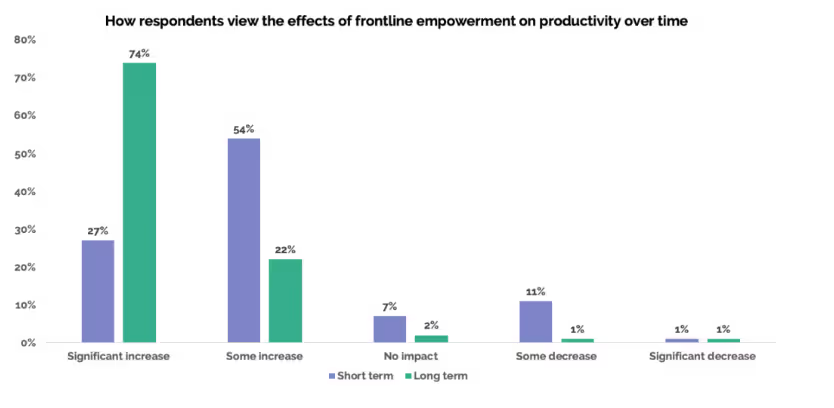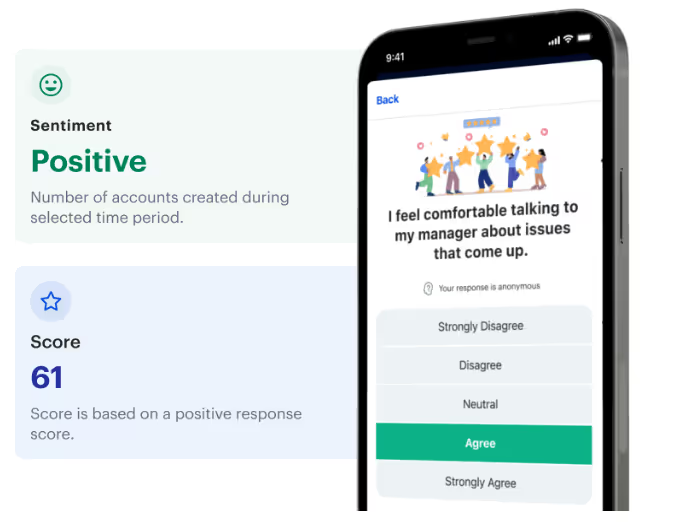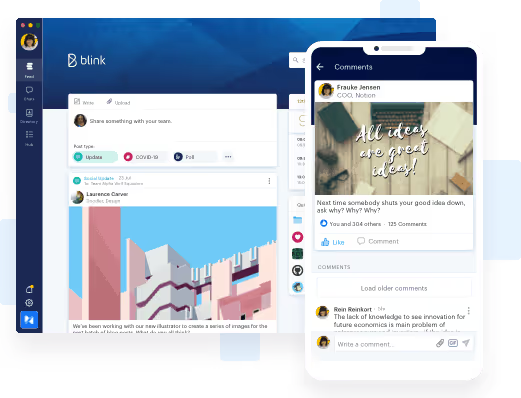The frontline industry is currently facing more challenges than most when it comes to empowering staff.
The Great Resignation, toxic leadership and the rise of “Quiet Quitting” led to a frontline feeling overworked and undervalued. Today, frontline employees need to feel more supported, confident and empowered in their roles.
And there is hope. Slowly but surely, companies are beginning to realize the importance of empowering their frontline employees. And as more organizations come to see the value of Diversity & Inclusion (DE&I), the frontline sector is starting to transform. Workers are beginning to feel appreciated again, and they are finally able to do their jobs with pride.
But only if their leaders take charge.
So, how can you better empower frontline employees? What does employee empowerment even mean, anyway? And how does this affect your frontline workers specifically?
Read on to learn everything you need to know about empowering your frontline team, from what frontline empowerment really is, to why it matters and how you can implement it. With the right tools and empowerment strategies in place, your frontline can be more engaged, productive, and empowered than ever before!
Key challenges faced by frontline employees
80% of the global workforce already performs physical or deskless work. In order to keep things running smoothly for the majority of the global workforce, those on the frontline need to be able to rely on a few things.
Unfortunately, many of them are currently facing challenges that are making their jobs more difficult than they should be.
- Pay increases have not kept up with inflation: This means that those on the frontline are struggling to make ends meet, and it can be hard to keep morale high when you're not being rewarded for your hard work.
- The frontline are often passed over for opportunities their desked peers are given: This can make it harder for them to advance in their careers and stay motivated or productive on the job, which has led to frustration, disillusionment, and the rise of the Great Resignation.
- If treated like desk-based workers, the frontline can't succeed: Deskless employees need to be given the necessary tools and training to perform their jobs well, as well as access to technology that improves communication and collaboration. Without it, companies will continue to see a lack of productivity and engagement among their workforce.
- Lack of leadership enablement: Leadership needs to let go and resist the urge to try and fix all problems themselves. They need to trust that mid-level managers have the ability to train and support the frontline. When a problem occurs, leaders need to equip managers with the right tools to overcome frontline challenges.
- Lack of frontline engagement: Without two-way communications, it is more difficult for leaders to make the frontline want to engage. As such, they are struggling to build trust and confidence with their teams. The truth is, if you're good to the frontline, they'll be good to your bottom line. You need to show your frontline you care to earn their engagement.
- No ambassadors: Without frontline ambassadors, there's no way to drive good will, reputation and sales. Frontline employees are the face of your company. If they love their jobs, they'll naturally want to spread the word about what you do.
Because of these industry challenges, many frontline employees have been left unhappy, unmotivated, and leaving companies faster than you can say quiet-quitting.
Today , leaders are facing a limited workforce. Because of this labor shortage, they are looking for more effective ways to reach higher levels of productivity, employee retention and ultimately, success.
What does frontline empowerment mean?
So what actually is frontline empowerment? What's the substance behind the hype?
At its core, frontline empowerment is about giving your frontline workers the freedom and authority to make decisions and take valuable action on their own. This means providing them with all the resources, information, training, and tools they need to succeed at their jobs.
Of course, empowering your frontline won't happen overnight - it takes time and effort. But by introducing the notion of 'doing more with less', using effective employee tools to drive change and productivity, and committing to ongoing communication and training, you can create a successful and sustainable culture of empowerment that will benefit everyone involved.
Why empowering the frontline is so important
Did you know that almost all (90% of) organizations say success depends on empowering frontline employees to make decisions in the moment?
With a culture of empowerment in place, those on the frontline can bridge the gap between management and the rank-and-file, allowing them to collaborate more effectively and achieve higher levels of engagement. This in turn boosts engagement across your entire workforce, creating a culture where everyone feels valued and motivated to succeed.
Additionally, there's no lack of research to back the frontline empowerment trend. A 2020 Harvard Business Review Analytic Services survey gathered the insights of 464 business executives across an array of industries.The findings were clear: organizations empowering their frontline employees are seeing an array of benefits, and those who are not are falling behind.
Here are a few reasons why frontline empowerment is vital to your corporate culture and overall company success:
1. Cultivating a sense of belonging to retain the best talent
"The vast majority of deskless workers (97%) report that they would stay in their current roles if their conditions improved. Such conditions go beyond a pay rise, meaning that HR needs to offer deskless workers the same opportunities as their deskbound counterparts."
This means prioritizing your team's mental health, giving them the right technology and resources they need to thrive and investing in their engagement and empowerment to create a true sense of belonging. In order to retain the best talent and build a strong, engaged workforce, empowering your frontline is essential.
It helps to create a collaborative culture where everyone feels like an integral part of the team. This kind of environment reduces turnover rates and builds up a strong sense of camaraderie that drives long-term success for your organization.
2. Improving frontline engagement and morale
Empowered frontline employees are engaged frontline employees. An engaged frontline workforce means better employee morale and cohesion between your frontline teams.
By empowering the frontline, you are also giving them the authority to make decisions on their own and take action in real-time - something that is vital when dealing with fast-paced, dynamic business environments. In turn, this continuous flow of engagement not only keeps everyone motivated and engaged, but it also creates more transparency and trust between management and those on the frontline.
With engagement as a natural part of your organizational culture, you can also expect to see improved productivity, performance and results from your frontline teams. On top of this, a disengaged employee costs around 34% of their annual salary, meaning that strong engagement can actually have a direct positive impact on your bottom line.

3. Satisfied staff leads to satisfied customers
Frontline workers are the first point of call between your organization and your customers, yet they remain an afterthought in many digital workplaces. This causes a lack of motivation in workers and a disconnect from the wider workforce – and their customers.
Simply put: when you empower frontline staff, you improve customer satisfaction.
Customer feedback, whether positive or negative, is extremely valuable to any business. And in order to get that feedback, you need your frontline employees, who are interacting with customers on a daily basis, to feel empowered and engaged to take action.
By giving the right tools and resources to your frontline teams, as well as giving them autonomy over how they do their jobs, you can facilitate better interactions with customers and improve overall customer satisfaction levels.
How to introduce, implement and sustain frontline empowerment
While HR trends state a range of strategies on the horizon for the frontline in 2023, including implementing mobile-first self-service enterprise software, increasing career opportunities and improving working conditions, one thing is clear. HR will drastically increase investment in its deskless workers over the coming months and years.
So how can you keep up with the trend? How can you introduce, implement and sustain frontline empowerment within your organization? Here are our eight top tips:
1. Start a frontline management flywheel to drive success
As leaders looking to empower their frontline, it's vital to define the standard you want to achieve. Defining this level of performance will help you set a standard to aspire to. A frontline management flywheel - defined by small management wins that accumulate over time to drive overall business growth - can help you map out how to start, implement and sustain successful empowerment initiatives.
Some core components of a frontline management flywheel include setting clear goals, aligning the right resources behind those goals, measuring progress and scaling success as you go.
2. Provide the right training for each level of worker
Ongoing and engaging training is key when it comes to empowering the frontline. This means making sure that your deskless workers have access to the right training programs and resources to be successful in their jobs, as well as investing in regular management training for those at the top of your organization.
For deskless workers, this means providing virtual or on-the-job training, as well as investing in coaching and mentoring programs that can help them to grow. For management-level employees, this means providing opportunities for professional development or leadership training.
3. Give them decision making abilities
In order for frontline empowerment initiatives to be successful, it's important that your frontline workers are equipped to make important decisions on the spot. Providing them with the right tools, resources and training can help them lead effectively, and empower them to make quick decisions when needed.
Equipping frontline managers to lead, make important decisions with confidence and empower their teams to do the same will help to drive better results for your organization as a whole.
One great example of this is Salutem's SELF initiatives - giving employees opportunities to be part of important decisions by empowering them with a Salutem Employee Listening Forum facilitated by the Blink employee app – an intuitive, two-way, all-in-one solution to employee communications.
4. Provide the right tools and technology
With 52% of frontline workers claiming they would leave their job over tech tools, it’s clear to see the impact that the right employee technology and digital employee experience can have on a company.
Empowering the frontline is not just about giving them more autonomy in their roles – it's also about giving them the right tools, training and resources they need to be successful in these roles.
By investing in key employee technology platforms, you can equip your frontline teams with what they need to do their jobs more efficiently and effectively, to reach better performance and results.
This might include employee scheduling software, communication and collaboration tools, or even data analytics software that can help deskless workers make more informed decisions on their own.
5. Get and give regular feedback
As with any other important initiative in your organization, empowering the frontline requires a commitment from leadership. This means that as a leader, it's important to get regular feedback on how these initiatives are going, as well as giving your frontline managers and employees the opportunity to provide their own feedback about how you can continue to grow and improve their employee experience.
By making a commitment to getting and giving regular feedback, you can stay on top of the changes and challenges that come with empowering your frontline team, and continue to make meaningful improvements along the way.
6. Have a thorough onboarding process
At Blink, we recently held a five-day hackathon where our conversations highlighted that onboarding processes are not only key to a successful retention strategy at our company but also for many of the large organizations that we work with.
Your onboarding process is where your employees get their first impression of what it's like to work at your organization. And so, it's important that this experience is a positive one, and that your deskless workers are set up for success right from the start. Unfortunately, only 12% of employees feel strongly that their organization does a great job onboarding new people.
This might include providing ongoing training and support during onboarding, or making sure that all of the necessary tools, including employee experience tools, and resources are available, accessible and set up from day one.
Blink's Hub - a centralized and secure frontline environment where digital forms, policies, safety guidelines and other relevant documents are stored - allows frontline organizations to store private and secure information that are shareable by teams. These allow frontline workers to access relevant documentation (training, e-learning materials, videos) to accelerate their onboarding process.
Blink's Directory also allows users to know who's doing what and in what team, making onboarding a whole lot smoother for leadership, too.
7. Recognize and reward hard work
To empower your frontline team and create a sense of autonomy and ownership, it's essential to recognize their hard work and reward them accordingly. You can think about offering the right mix of rewards, recognition and incentives that can motivate them.
Why? Well, 36% of employees say lack of recognition is the top reason to leave their job, while
more than 40% of employees feel that being recognized often means they put more energy into their work.
Addressing this will require regular performance reviews, incentive programs or even creative rewards such as Kudos, personalized gift cards or experiences that can motivate your frontline team to continue doing their best work.
How Blink can help you empower your frontline
Employee Surveys
With Blink's Employee Surveys, you can regularly pulse check your frontline to get a consistent sense of what's going on for your workforce. By gathering reliable, real-time data you can ensure you're doing what's right before it's too late. By maximizing the right initiatives, HR leaders are able to encourage getting and giving regular feedback.

Feed
Create a sense of belonging using Blink's Feed. The Feed opens up multi-directional conversations allowing the frontline to share thoughts and feedback through polls, sentiment through reactions, likes and comments. With Feed, you're able to create a culture of constant improvement, and encourage your frontline to continue putting their feedback forward.

Employee Recognition
Blink's Recognition feature allows anyone in the company to recognize hard work and achievements, as well as spread positive word of mouth about their team members. By giving your frontline team the opportunity to recognize each other's work, and by providing regular recognition programs and incentives, you will empower your employees.

Blink Champions
Without team members championing your empowerment initiatives, it can be hard to get them off the ground. As such, Blink Champions are the cornerstone of a successful launch for your next frontline empowerment initiative. The role of a Blink Champions includes:
- Working with other Champions to ensure the launch is a success
- Raising awareness of Blink and encouraging others to use the app
- Being active in the Feed
- Educating teams on how to use the app
- Being an advocate for Blink.
Hear from Brittany Schlacter, Communications Specialist and Blink Champion at The Rapid:
https://www.youtube.com/embed/pbi0QDbucpY
Final Thoughts
The race is on for frontline leaders to empower their workers. And fortunately, frontline leaders know this is needed and are ready to take the necessary steps to make it happen.
We've highlighted some of the ways that you can empower your frontline team, including investing in your digital transformation efforts, recognising and rewarding hard work, and using Employee Surveys to gather and act on feedback.
By implementing some of these initiatives, you can create a sense of autonomy and ownership among your employees, driving productivity and growth in your organization.
To unlock frontline empowerment to its highest potential, consider investing in the Blink employee app. With tools like Employee Recognition, Hub, Feed and a dedicated champion team, you'll be able to empower your frontline employees in no time!



